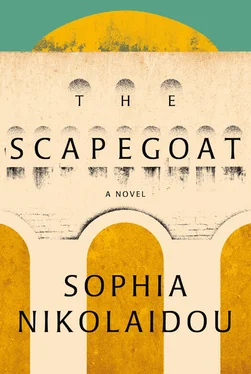This theory seemed to hold up, but Antrikos was related to the prime minister — yes, the same prime minister who had taken personal responsibility for the case — an inconvenient fact that created significant obstacles for anyone wanting to pursue that line of inquiry. Tzitzilis called him down for questioning several times, and Antrikos was always unbearably specific and unremittingly precise. Almost insolent. He surely sensed where Tzitzilis was heading, and didn’t leave him the slightest margin. He answered questions with questions, lit cigarettes without asking permission, showed that he knew perfectly well who had the upper hand. Tzitzilis soon realized he was wasting his time.
Antrikos had joined forces with Zouzou, and together they bombarded the Ministry of Public Order with complaints. Back in Athens, when she saw the reporters swooping down like vultures to pick apart her daughter’s reputation, the widow’s mother grabbed them by the collar and dragged them into the house, straight into her bedroom.
— Look, she told them. This is the girl you’re ringing doorbells and loitering around on sidewalks for.
Zouzou was silently crying. She wasn’t the worldly widow they’d been hearing about, she was just a child, a little girl sobbing in her mother’s bed. She looked more like an orphan than anything else, a tiny, bird-like body, all bones.
Meanwhile, Thomas Tzitzilis was starting to worry. Every theory he’d come up with had crumbled before his eyes. The witnesses were unwilling to cooperate, no one wanted to get involved, most of them refused to open their mouths. But he had promised God and his superiors that he would solve the case. And so he would close the file. The Americans would get their perpetrator, his head served to them on a silver platter.
And if we don’t have a perpetrator, well, some Greek will have to sacrifice himself for the cause. It wouldn’t be a terrible blow, if it meant saving the rest of the country . Those were the kinds of thoughts that ran through his mind, though he didn’t admit them to anyone else, even if he knew he was right in his thinking. The case had taken on greater dimensions. The Americans kept forming committees, poking their noses into everything, sending generals and judges to the embattled country. Congress was up in arms, newspapers and radios buzzed in New York and Washington. U.S. taxpayers weren’t going to keep sending money to these barbarians if they were going to respond by murdering American citizens.
And so they threw the blame on the Greek government. Even the kindly disposed, who openly supported the Greeks for having declared a holy war against the communists within their own borders, expressed reservations.
Amid the chaos, with everyone beating his own drum yet cursing the government in unison — and the Greek police even more — for stalling and possibly covering up its own sins, Tzitzilis steadily sought the guilty party. The inhabitants of the city saw him in the churches of Agia Sophia and Agios Dimitrios, patron saint of Salonica, and in the Church of the Virgin Acheiropoiitos, praying with damp eyes to the All-Powerful, seeking the enlightenment he needed in order to overcome American insults and Greek idiocy alike. To find a solution that would prove acceptable to all.
An American general was dispatched by Congress. He barged into Tzitzilis’s office without knocking and let forth a stream of sailor’s curses, as he might have cursed a lackey or an underling, not a Major of the Gendarmerie and head of the Security Police. The American had no sense of protocol, that’s precisely why they’d sent him to bare his teeth, to tell Tzitzilis how things stood, without fancy prologues or arguments. Officer to officer, brass to brass. The American knew that when it came down to it, the Greek was his subordinate. So he treated him as such. And Tzitzilis swallowed the insult.
The General insisted that the crime had been committed by that hussy, Jack’s widow, who had been seen dancing in jazz clubs in Athens a month after the unfortunate event. He’d heard that Tzitzilis had abandoned that obvious solution and begun to investigate the case as a political murder. Tzitzilis had in fact called a meeting behind closed doors with his most trusted men, though the possibility that it had been a political crime had been raised even before that. It suited the government, would shut up opponents, offered a ready explanation. To Tzitzilis it was clear as day that the commies wanted to discredit Greece, to bring the country’s leaders down and drag them through the mud, to pressure the Americans to pack up and go home. But the investigation was still in its infancy, the evidence still a confused mess. All the different pieces would have to be brought into line if they were to convince anyone.
The General huffed.
— Your department is not doing its job, he said, pounding his fist on Tzitzilis’s desk. The American people demand you find the guilty party. And in a matter of days, he ordered, and left without saying goodbye.
Whoever seeks will find.
A reporter who spoke English, former member of the communist insurgency. The last person to see Talas alive, according to witnesses. Of course the meeting only lasted five minutes, but no one cared about such details. A communist plot was an acceptable solution.
Gris had no police record. He was a calm, quiet man, almost suspiciously so. He took care of his mother and supported his sisters. He didn’t spend money on things he didn’t need, apart from his four packs of cigarettes a day. Sometimes he forgot and lit a new one with the old one still burning. He would hold both between two fingers and inhale them together. As tough as they come, though he didn’t look it.
Tzitzilis had no intention of wasting time on preliminary questioning, corroboration, modification. This version would stick, and it was high time they were through with the case, for the good of the country .
All those who expressed doubt and distrust of the hurried proceedings — suspicious characters, the lot of them, and anti-Greek, in Tzitzilis’s estimation — quickly learned to hold their tongues. Military tribunals took place even on weekends. Blood flowed freely. Everyone on both sides of the political spectrum had seen enough death.
The country’s citizens might have learned to keep quiet, but the numbers spoke volumes. On May 3, 1948, a total of 152 communists who’d been condemned to death were executed, a fact that seemed entirely logical to the side doing the killing. Some whispered that the executions were in retaliation for the assassination of Ladas, the Minister of Justice, by the Organization for the Protection of the People’s Struggle. Ladas had been the one who decided to revoke the citizenship of communists en masse. He was also the one who signed orders of execution. But the communists, too, killed indiscriminately. The two sides competed in harshness and barbarism: they burned people alive, decapitated corpses, stoned and bludgeoned and raped.
There was no end to the evil. Some executed, and others executed the executioners. Heroes became traitors and traitors heroes, depending on who was speaking. No one escaped, the traps had been set. People were condemned according to what they believed, not what they had done. Of course everyone said it was a sad state of affairs. Yet the killing continued apace. In the end political neutrality became a dangerous position. The country was ruled by paroxysms of fanaticism and intolerance. Whoever had a dissenting opinion learned to keep his mouth shut.
Those on the outside, even those who were bankrolling the slaughter, were revolted by the photographs that circulated abroad. Greece had become front-page news. One image in particular had been seen all over the world: a man on horseback with the heads of three female guerilla fighters hanging from his saddle, tied by their braids. The prime minister made some neutral comment about it being an old Greek custom, and promised the incident wouldn’t be repeated — at least not with the heads of women.
Читать дальше












